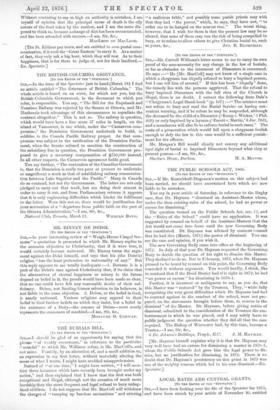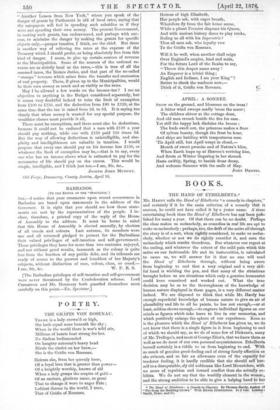LOCAL RATES AND CENTRAL GRANTS.
[TO THE EDITOR OF THE "smarm:m:1 have been looking over the file of the Spectator for 1875, and have been struck by your article of November 20, entitled
" Another Lesson from New York," where you speak of the danger of grants by Parliament in aid of local rates, saying that the ratepayers will feel in spending such subsidies as if they were not spending their own money. The present Government, in making such grants, has endeavoured, and perhaps with suc- cess, to minimise the danger by making the grants for specific objects only,—pauper lunatics, I think, are the chief. But there is another way of relieving the rates at the expense of the Treasury which I should prefer, as being absolutely free from this kind of danger. I mean, to give up certain sources of revenue to the Municipalities. Some of the sources of the national re- venue are as strictly local as the rates,—this is true of all the assessed taxes, the licence duties, and that part of the so-called " stamps " revenue which arises from the transfer and succession of real property. These, if given up to the Municipalities, would be their own money as much and as visibly as the rates.
May I be allowed a few words on the income-tax'? I see no objection to anything in the Budget considered separately, but it seems very doubtful indeed to raise the limit of exemption from £100 to £150, and the deduction from £80 to £120, at the same time that the lax is raised from 2d. to 3d. It is saying too clearly that when money is wanted for any special purpose, the wealthier classes must provide it all.
There must be exemptions, and there must also be deductions, because it could not be endured that a man with £149 a year should pay nothing, while one with £150 paid 150 times 3d. But the way of allowing deductions is unintelligible, and sim- plicity and intelligibleness are valuable in taxation. I would propose that every one should pay on his income less £150, or whatever the limit of exemption may be,—that is to say, every one who has an income above what is estimated to pay for the necessaries of life should pay on the excess. This would be simple, intelligible, and I think just too.—I am, Sir, &c.,
JOSEPH JOHN MURPHY.
Old Forge, Dunmurry, County Antrim, April 16.































 Previous page
Previous page